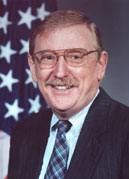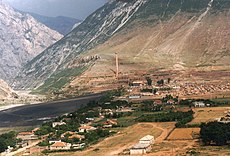
The Kosovo War was an armed conflict in Kosovo that lasted from 28 February 1998 until 11 June 1999. It was fought between the forces of the Federal Republic of Yugoslavia (FRY), which controlled Kosovo before the war, and the Kosovo Albanian separatist militia known as the Kosovo Liberation Army (KLA). The conflict ended when the North Atlantic Treaty Organization (NATO) intervened by beginning air strikes in March 1999 which resulted in Yugoslav forces withdrawing from Kosovo.

Since the breakup of the Socialist Federal Republic of Yugoslavia in the early 1990s, the foreign policy of the newly established Federal Republic of Yugoslavia was characterized primarily by a desire to secure its political and geopolitical position and the solidarity with ethnic Serbs in other former Yugoslav republics through a strong nationalist campaign. While the country was involved in Yugoslav Wars and therefore exposed to several rounds of devastating sanctions against Yugoslavia this involvement was often denied for political or ideological reasons. In the initial period Federal Republic of Yugoslavia unsuccessfully aspired to gain international recognition as the sole legal successor state to SFR Yugoslavia, the country which was one of the most prominent foreign policy subjects during the Cold War.

The United Nations Interim Administration Mission in Kosovo is the officially mandated mission of the United Nations in Kosovo. The UNMIK describes its mandate as being to "help the United Nations Security Council achieve an overall objective, namely, to ensure conditions for a peaceful and normal life for all inhabitants of Kosovo and advance regional stability in the Western Balkans."
The Račak massacre or Račak operation was the massacre of 45 Kosovo Albanians that took place in the village of Račak in central Kosovo in January 1999. The massacre was perpetrated by Serbian security forces in response to Albanian separatist activity in the region. The Serbian government refused to let a war crimes prosecutor visit the site, and maintained that the casualties were all members of the rebel Kosovo Liberation Army (KLA) killed in combat with state security forces.

The Kosovo Force (KFOR) is a NATO-led international peacekeeping force and military of Kosovo. KFOR is the third security responder, after the Kosovo Police and the EU Rule of Law (EULEX) mission, respectively, with whom NATO peacekeeping forces work in close coordination. Its operations are gradually reducing until the Kosovo Security Force, established in 2009, becomes self-sufficient.

William Graham Walker is a United States Foreign Service diplomat who served as the US ambassador to El Salvador and as the head of the Kosovo Verification Mission.

The Republic of Kosova, also known as the First Republic of Kosovo, was a self-declared proto-state in Southeast Europe established in 1991. During its peak, it tried to establish its own parallel political institutions in opposition to the institutions of the Autonomous Province of Kosovo and Metohija held by Yugoslavia's Republic of Serbia.

United Nations Security Council resolution 1244, adopted on 10 June 1999, after recalling resolutions 1160 (1998), 1199 (1998), 1203 (1998) and 1239 (1999), authorised an international civil and military presence in the Federal Republic of Yugoslavia and established the United Nations Interim Administration Mission in Kosovo (UNMIK). It followed an agreement by Yugoslav President Slobodan Milošević to terms proposed by President of Finland Martti Ahtisaari and former Prime Minister of Russia Viktor Chernomyrdin on 8 June, involving withdrawal of all Yugoslav state forces from Kosovo.
The political status of Kosovo, also known as the Kosovo question, is the subject of a long-running political and territorial dispute between the Serbian government and the Government of Kosovo, stemming from the breakup of Yugoslavia (1991–92) and the ensuing Kosovo War (1998–99). In 1999, the administration of the Autonomous Province of Kosovo and Metohija was handed on an interim basis to the United Nations under the terms of UNSCR 1244 which ended the Kosovo conflict of that year. That resolution reaffirmed the territorial integrity of Serbia over Kosovo but required the UN administration to promote the establishment of 'substantial autonomy and self-government' for Kosovo pending a 'final settlement' for negotiation between the parties.
The Gornje Obrinje Massacre refers to the killing of 21 Kosovo Albanians, belonging to the same family, in a forest outside the village of Donje Obrinje on 26 September 1998 by Serbian Police Forces during the Kosovo War. Among the victims were women and children.
The Military Technical Agreement, also known as the Kumanovo Agreement, signed between the International Security Force (KFOR) and the Governments of the Federal Republic of Yugoslavia and the Republic of Serbia, was an accord concluded on 9 June 1999 in Kumanovo, Macedonia. It resulted in the end of the Kosovo War, and established new basic relations between Yugoslavia and the Kosovo Force, which would act to replace units of the Yugoslav Army in Kosovo.

United Nations Security Council resolution 1160, adopted on 31 March 1998, after noting the situation in Kosovo, the council, acting under Chapter VII of the United Nations Charter, imposed an arms embargo and economic sanctions on the Federal Republic of Yugoslavia, hoping to end the use of excessive force by the government.

United Nations Security Council resolution 1199, adopted on 23 September 1998, after recalling Resolution 1160 (1998), the Council demanded that the Albanian and Yugoslav parties in Kosovo end hostilities and observe a ceasefire.

United Nations Security Council resolution 1207, adopted on 17 November 1998, after recalling all resolutions concerning the conflicts in the former Yugoslavia, in particular Resolution 827 (1993), the Council condemned the Federal Republic of Yugoslavia for its failure to execute arrest warrants issued by the International Criminal Tribunal for the former Yugoslavia (ICTY).

United Nations Security Council resolution 1239, adopted on 14 May 1999, after recalling resolutions 1160 (1998), 1199 (1998) and 1203 (1998), the Council called for access for the United Nations and other humanitarian personnel operating in Kosovo to other parts of the Federal Republic of Yugoslavia.

United Nations Security Council resolution 1345, adopted unanimously on 21 March 2001, after reaffirming resolutions 1160 (1998), 1199 (1998), 1203 (2000), 1239 (1999) and 1244 (1999) on the situation in the former Yugoslavia, the council condemned extremist violence and terrorist activities in parts of Macedonia and southern Serbia and called upon Kosovo Albanian leaders to condemn the violence.
Gabriel Keller is a French diplomat and teacher. Keller earned a history professor agrégé degree in 1972 at Paris West University Nanterre La Défense.

The OSCE Kosovo Verification Mission (KVM) was an OSCE mission to verify that the Serbian and Yugoslav forces were complying with the UNSC Resolution 1203 and the Clark-Naumann agreement, to end atrocities in Kosovo, withdraw armed forces from Kosovo, and abide by a ceasefire. The mission was deployed on 25 October 1998, withdrawn in March 1999 and was closed on 9 June 1999.

United Nations Administered Kosovo refers to the period between 1999 and 2008 when the United Nations Interim Administration Mission in Kosovo was directly responsible for the governance of Kosovo. This period began on 10 June 1999 with the passing of United Nations Security Council Resolution 1244 and effectively ended on 17 February 2008 with the unilateral declaration of independence of Kosovo.
Operation Eagle Eye was the result of the NATO-Kosovo Verification Mission agreement which was signed in Belgrade on 15 October 1998, under which the Federal Republic of Yugoslavia agrees to establish an air surveillance system consisting of NATO non-combatant reconnaissance aircraft and unmanned aerial vehicles.













